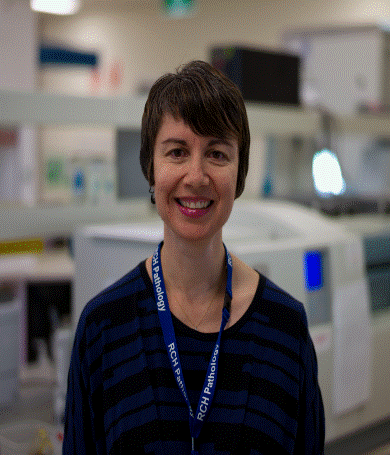My FASM Experience
Gena GonisSenior Scientist, Bacteriology Laboratory, The Royal Children’s Hospital, Melbourne.
Microbiology Australia 33(4) 000-000 https://doi.org/10.1071/MA12904
Published: 1 November 2012
Abstract
My association with The Australian Society for Microbiology began as an honours student at Melbourne University when my then supervisor, Dr Roy Robins-Browne, gave me a student membership as my 21st birthday present. I have been an ASM member ever since! When I graduated from university, I found I had reached a crossroad. I loved research, but just missed out on a PhD scholarship and so decided to go out into the workforce. My first job was in the Bacteriology Laboratory of a small private pathology service. I found the work so enjoyable that when faced with the same choice 2 years later, being offered a PhD scholarship and a job at the Royal Children’s Hospital diagnostic bacteriology laboratory at the same time, I jumped at the opportunity to work at the hospital. That was more than 25 years ago!

|
After working in diagnostic microbiology for nearly 10 years, I felt I needed to update my knowledge in microbiology. For me, studying for exams is the best way to obtain this knowledge. I wanted to do this because I envisaged a long-term career in diagnostic microbiology. I looked into my options and decided that the Fellowship of The Australian Society for Microbiology (FASM) fulfilled my goal of updating my knowledge in microbiology in a way that was directly relevant to my job as a diagnostic microbiologist.
The FASM achieves this in the following ways:
Part 1 is a general exam in microbiology consisting of a written (multiple choice and short answer/essays) and a practical exam. In order to sit for this exam, you need a broad knowledge of all aspects of microbiology, so I gave myself one year to prepare for it. I attended tutorials and lectures in addition to reading prescribed texts and summarising information. Once completing the Part 1 I felt that my general knowledge in microbiology was up to date and I was ready to concentrate on more specific areas in more depth in Part 2.
Part 2 is an exam consisting of 3 questions. The first 2 questions are in areas that you can nominate and the third is on laboratory management. This is a great opportunity to concentrate on areas that interest you and improve your knowledge and hence your performance in the workplace. My topics in my nominated area (clinical microbiology) were antibiotics and gastroenteritis. Because you know the topics you can devote as much time as you need to prepare in the 2 months before the exam. The laboratory management question was important because as a young scientist of 10 years experience at the time, it made me think about how to run a laboratory from the point of view of management rather than as a bench scientist.
Part 3 is a dissertation in an area of your choice. This is once again a great opportunity to choose a topic of interest that will improve your knowledge and understanding. I chose zygomycoses because these infections, although rare, can be devastating when they occur in immunocompromised patients. Improving my knowledge in this area allowed me to assist clinicians when faced with the diagnostic dilemmas such infections bring.
The beauty of the FASM is that you can prepare at your own pace and you can choose topics that will be directly relevant and beneficial to you in your workplace. You do need to be very organised and self motivated to study for the FASM as it does not have a prescriptive syllabus. Nowadays, scientists have study leave provisions in the award that they can access to assist them with study time; you can keep working and study at the same time. When I started I was married with no children and when I finished I had one child and a second on the way!
In an age where higher education is very costly, the FASM is comparatively cheap to obtain. Once FASM is obtained, scientists are paid a higher qualification allowance equivalent to that of a PhD in recognition of this achievement.
The FASM has given me up-to-date knowledge in my area of expertise and the confidence that goes with that knowledge is immeasurable. It has helped me to obtain higher positions based on merit.
If you see microbiology as a long-term career prospect and you aspire to be the best microbiologist you can be, then the FASM is for you.


